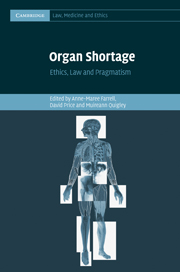Book contents
- Frontmatter
- Contents
- List of figures
- List of tables
- Contributors
- Acknowledgements
- List of abbreviations
- Table of cases
- Table of legislation
- Part I Setting the scene
- Part II Current issues affecting organ shortage
- Part III Strategies for addressing organ shortage
- Part IV Comparative perspectives
- Part V Current reform and future challenges
- 14 Negotiating change: organ donation in the United Kingdom
- 15 Addressing organ shortage in the European Union: getting the balance right
- 16 Promoting organ donation: challenges for the future
- Bibliography
- Index
15 - Addressing organ shortage in the European Union: getting the balance right
from Part V - Current reform and future challenges
Published online by Cambridge University Press: 29 March 2011
- Frontmatter
- Contents
- List of figures
- List of tables
- Contributors
- Acknowledgements
- List of abbreviations
- Table of cases
- Table of legislation
- Part I Setting the scene
- Part II Current issues affecting organ shortage
- Part III Strategies for addressing organ shortage
- Part IV Comparative perspectives
- Part V Current reform and future challenges
- 14 Negotiating change: organ donation in the United Kingdom
- 15 Addressing organ shortage in the European Union: getting the balance right
- 16 Promoting organ donation: challenges for the future
- Bibliography
- Index
Summary
In recent years, a range of policy and regulatory initiatives have been taken at European Union (EU) level in relation to organ donation and transplantation. The European Commission (Commission) set out its current policy in its Action Plan on Organ Donation and Transplantation (2009–2015) (the Action Plan) which was published in December 2008. The plan focuses on the need to improve quality and safety, increase organ availability and make organ transplantation systems more efficient, both within Member States and on an EU-wide basis. It was accompanied by a legislative proposal that has since been adopted at EU level and now establishes an EU-wide regulatory regime for organ donation and transplantation (Organs Directive). The aim of this chapter is to examine such initiatives in detail with a view to assessing whether they are likely to address what is acknowledged to be the main challenge in the field, namely organ shortage.
In using the term ‘organ shortage’ in this chapter, I take as my starting point the current gap between demand for organs for transplantation and available supply from organ donors. The policy approach taken at EU level proceeds from such an understanding and focuses on strategies to address the situation. In adopting this approach, I acknowledge that there are differing views as to how and why organ shortage arose, as well as a division of opinion on whether there is a need to devise strategies to reduce or eliminate the shortage or whether the focus should instead be on how best to allocate existing supply.
- Type
- Chapter
- Information
- Organ ShortageEthics, Law and Pragmatism, pp. 227 - 244Publisher: Cambridge University PressPrint publication year: 2011



